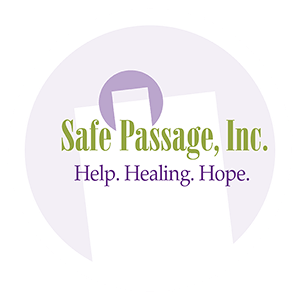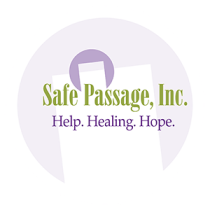Domestic Violence is a pattern of abusive tactics used by one partner in a relationship to gain and/or maintain power and control over another intimate partner. These tactics can be physical, emotional, verbal, financial, psychological, threats of actions or the use of technology. This includes actions used to manipulate, intimidate, scare, isolate, coerce or threaten someone.
Sexual Abuse is any sexual act that occurs without consent. Also referred to as sexual assault or sexual violence, this includes unwanted sexual touching, forced oral sex, and rape, among other sexual acts.
If you are unsure if you are a victim, speak with one of our advocates for more information.
Yes. Whether you have experienced domestic or sexual violence today, or many years ago, Safe Passage provides free, voluntary, and confidential services to all survivors of domestic and sexual violence.
There is no cost to our services.
Confidentiality is a key component in services provided by Safe Passage, and we will protect the confidentiality of all information obtained throughout the duration of services, unless you provide written consent allowing us to share information with any other entity. The only time Safe Passage will share any information without this written consent is to stay in accordance with State and Federal laws.
Call our Helpline to speak with an advocate 24/7 at 877-733-1990. Alternatively, you can text 877-733-1990 between the hours of 9am and 9pm Monday-Sunday.
Safe Passage does not have on-staff attorneys, and we are unable to provide any legal advice. However, we can help you navigate the legal system. Our Empowerment Specialists may be able to attend court hearings, civil mediation and provide assistance with filing protective orders.
Advocates perform varying roles depending on the system in which they work. Victim Advocates/Victim Assistants who work in the prosecutor’s office work as a liaison between the victim of a crime and the prosecutor. They will provide information about court proceedings regarding the criminal case of which the victim is involved in and answer any questions about the case.
Domestic and sexual violence victim advocates provide support services to victims. They assist survivors in their healing journey, providing education, emotional support, safety planning, advocacy within other systems and connect victims with additional resources.
Empowerment Specialist is Safe Passage’s unique title for our victim advocates who offer support for survivors of domestic and sexual violence.
Our support services are available to anyone who has experienced domestic and sexual violence.
Our Prevention and training services are available to schools, youth-focused agencies/staff, families, and the general community. Please read more in the Get Help and Prevention sections on this site.
Safe Passage Prevention offers a variety of programs for the community, parents, and schools. If you interested in getting prevention programming you can reach us by emailing prevention@safepassageinc.org or you can also call our business line at 1-812-933-1990 and ask to speak with one of our prevention specialists. If we are not available ask to leave a message and we will get back to you.
You can get involved with volunteering by contacting our Volunteer coordinator at admin@safepassageinc.org
When you donate to Safe Passage, you’re helping local victims of domestic and sexual violence and their families on their road to recovery. Donations can look like Memorials, current shelter needs, monetary, and more! Please click here to learn more about different ways you can donate to Safe Passage, or email support@safepassageinc.org.

